Winter is in full swing in Maryland and despite the ongoing Pandemic, people still need to go out to pick up medicine, buy groceries, and get other essential items.
According to Insurance Business America, Maryland is ranked the 7th WORST state among drivers.
Here are 10 things you can do to keep yourself safe on the road.
1. Store Your Documents Together
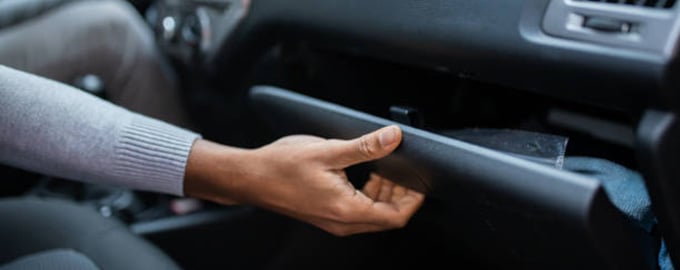
Keep all of your documents like: insurance card, registration, and other forms together. A good place to store these items is in your glove compartment or center arm rest. Your insurance card may have towing information. DO NOT keep these items in your purse or wallet because you can lose or forget them at home.
PRO TIP: If your insurance offers road-side assistance / towing, add that number into your phone!
2. Tires and Tire Pressure

Making sure your tires are in good shape is essential for preventing skidding on the road or getting a flat. If the tread on your tires has worn out, you run the risk of losing control of your vehicle on wet roads.
It’s also a good idea to check the air in your tires. Cold weather reduces tire pressure, it’s recommended you check tire pressure once a week during winter. Most modern cars have a low tire pressure indicator, some even tell you which tire is low on air. If you see the low tire pressure indicator on your dash, stop by a gas station and add some air to your tires! Good tire pressure not only makes your car safe, but it helps get better gas milage.
3. Check Your Lights
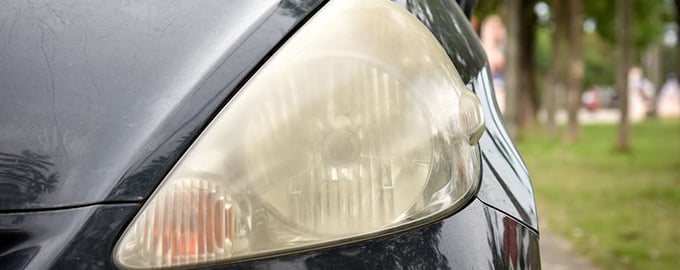
Nighttime visibility is critical to highway safety. About half of traffic deaths occur either in the dark, at dawn, or dusk. Seeing what’s in front of you when your driving is important, but you want other drivers to see you as well. Make sure that both of your headlights, tail lights, and brake lights work. If your headlights are clouded or yellowed or damaged, they may only generate about 20% of light that new headlights can. You should fix or replace them as necessary.
Drivers are not mind readers, they don’t know you need to switch lanes or pull over onto the shoulder. Make sure both of your cars turn signals and your hazard light button works. Letting other drivers know what you’re doing helps them keep at a safe distance from your vehicle.
4. Check Your Spare Tire
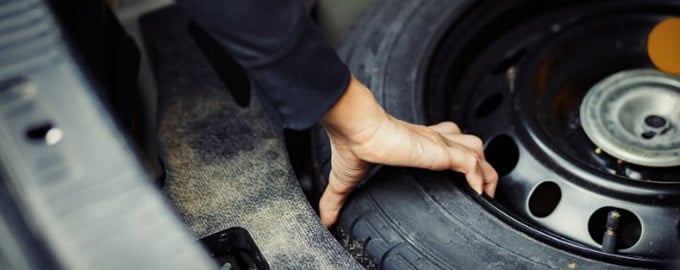
I-695 and I-95 are constantly under construction. This leads to a lot of debris on our highways that can easily puncture a tire and leave you on the side of the road.
Most people forget about their spare tire. Some, don’t even know where it is in their car! Check your cars owners manual to find the location of your spare tire. It’s recommended you check your spare tire once a month. Inspect it for cracks in the sidewall and check its tire pressure! Spare tires age like any other tire. Even if your spare tire never sees any use, it can still be affected by the passage of time.
PRO TIP: Know where your car jack is! Should you get a flat on the highway, we DO NOT RECOMMEND getting out of your vehicle. Call road-side assistance! If you are capable of changing your own tire, pull into a parking lot to change it. Again, DO NOT exit your vehicle if you are stranded on the highway!
5. Mirrors and Windows

Visibility is one of the most important aspects of driving. Check your mirrors and windows for cracks. Replace your windshield wipers regularly and clean your windows often.
Here is a great tutorial to SUPER CLEAN your windshield!
6. Fluid & Battery Check
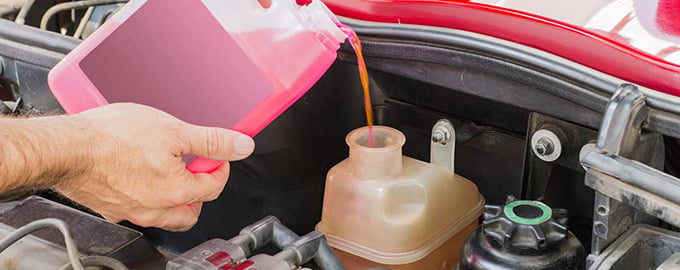
If you’ve been working from home, there’s a good chance you’re car has been sitting around. Open your hood and check the fluid levels of your oil and coolant. If you notice anything low, top it off. Move your car back a little and check the ground under it. If you see a puddle of fluid, it could mean your car has a leak. Visit a local repair shop to diagnose and repair the issue.
Cold weather is especially hard on car batteries. According to AAA’s Automotive Research Center, at 0°F, a car’s battery loses about 60 percent of its strength and at 32°F it loses 35 percent. During cold temperatures starting an engine can take up to twice as much current as needed under normal conditions. It is advisable to have your battery tested, as well as starting and charging systems prior to the deep cold of winter.
Here are some warning signs that may indicate a future battery related breakdown:
- You hear a grinding or clicking sound when you turn on the ignition
- Your vehicle cranks slowly when attempting to start
- Your headlights dim when idling but brighten when the engine is revved
- Your battery is more than three (3) years old
7. Emergency Kits
Every vehicle should have an emergency supply kit located in the trunk. Kits should be checked every six months, and expired items should be replaced to keep it up to date. Here are some items your vehicle emergency kit should include:
- A properly inflated spare tire, wheel wrench and tripod jack
- Jumper cables
- Tool kit and/or a multipurpose utility tool
- Flashlight and extra batteries
- First aid kit with gauze, tape, bandages, antibiotic ointment, aspirin, a blanket, non-latex gloves, scissors, hydrocortisone, thermometer, tweezers and instant cold compress
- Duct tape
- Additional items for cold weather include a snow brush, shovel, windshield washer fluid, warm clothing, cat litter for traction and blankets
- Nonperishable, high-energy foods, such as unsalted nuts, dried fruits and hard candy
- Car charger for your cell phone
- Reflective triangles and brightly colored cloth to make your vehicle more visible
- Drinking water
- Seatbelt cutter / glass breaker
8. Wear your seatbelt!

Seatbelt use is one of the most effective ways to save lives and reduce injuries in crashes. Yet millions do not buckle up on every trip. According to the CDC:
-
A total of 22,697 drivers and passengers in passenger vehicles died in motor vehicle crashes in 2018.2
-
More than half (range: 51%-60%) of teens (13-19 years) and adults aged 20-44 years who died in crashes in 2018 were not buckled up at the time of the crash.2
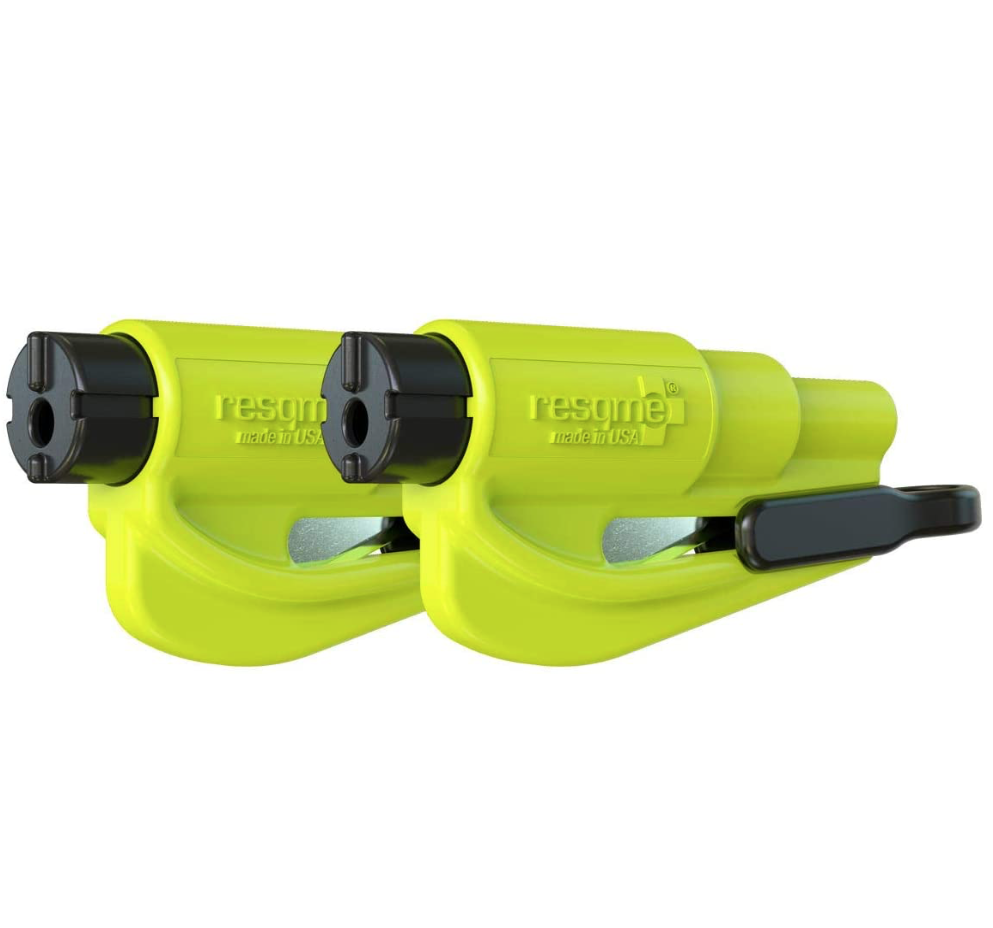 Even though seatbelts are the best safety feature in any vehicle, it’s good to have a backup plan. If you find yourself in an accident and you’re pinned, you need to be able to get out quickly. This product works as a seatbelt cutter and glass breaker allowing you to quickly escape from your vehicle.
Even though seatbelts are the best safety feature in any vehicle, it’s good to have a backup plan. If you find yourself in an accident and you’re pinned, you need to be able to get out quickly. This product works as a seatbelt cutter and glass breaker allowing you to quickly escape from your vehicle.
9. Check Your Brakes
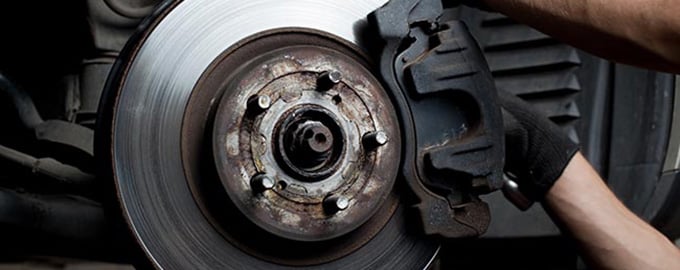
While some maintenance on you car can wait, brake maintenance is not one of those things. Being able to stop your vehicle when necessary is not only important for you and your passengers, but for everyone else on the road.
Take your car to a competent mechanic and have them inspect your pads, rotors, and brake lines to ensure everything is in proper working order.
10. Pay attention!

It’s easy to get distracted while driving today. Social media, texts, and other notification demand your attention at nearly all hours of the day. According to the CDC, teen drivers aged 15-19 are more likely to be distracted than drivers of any other age.
Put your phone on do not disturb while driving, get where you’re going safely, and reply to your messages/emails at your destination!
11. BONUS: Keep a spare mask in you car!

COVID-19 is on the rise in every single state and Maryland is no exception. Keep a spare mask in your car in case you forget yours at home and need to make a quick stop somewhere.
FREE Case Consultation
Fill out the form below and we will contact you.
[grow-contact-form]
Or, give us a call at